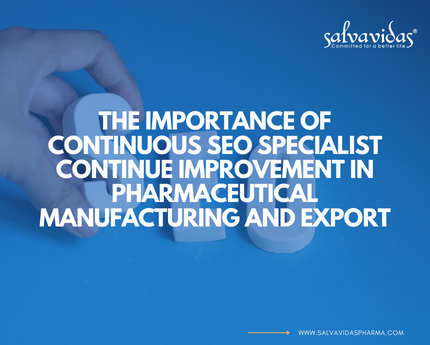
The Importance of Continuous SEO specialist continue Improvement in Pharmaceutical Manufacturing and Export
The pharmaceutical industry is a constantly evolving and highly regulated sector that demands high standards of quality, safety, and efficacy. With the increasing demand for life-saving medicines and treatments, it is crucial for pharmaceutical manufacturers to keep up with the latest advancements and technologies in order to meet the growing expectations of patients and regulatory bodies. This is where the concept of continuous improvement comes into play.
Introduction:
What is Continuous Improvement in Pharmaceutical Manufacturing and Export?
Continuous improvement refers to a systematic and ongoing effort to enhance the quality, efficiency, and competitiveness of an organization. In the context of pharmaceutical manufacturing and export, continuous improvement involves the identification of opportunities for improvement, the implementation of changes, and the measurement of the results to ensure that the desired outcomes have been achieved. The focus is on making small, incremental improvements that collectively have a significant impact on the overall performance of the organization.
The Benefits of Continuous Improvement in Pharmaceutical Manufacturing and Export
Continuous improvement can bring a range of benefits to the pharmaceutical industry, including:
- Enhanced Quality: By continuously seeking out opportunities for improvement, pharmaceutical manufacturers can ensure that they are producing high-quality medicines that meet the needs of patients and regulatory bodies.
- Increased Efficiency: By streamlining processes and eliminating inefficiencies, continuous improvement can help pharmaceutical manufacturers to increase their productivity and reduce costs.
- Improved Competitiveness: By staying ahead of the latest advancements and technologies in the industry, pharmaceutical manufacturers can maintain a competitive edge and meet the growing expectations of patients and regulatory bodies.
- Compliance with Regulations: By continuously improving their processes and procedures, pharmaceutical manufacturers can ensure that they are meeting the strict regulations and standards set by regulatory bodies.
How to Implement Continuous Improvement in Pharmaceutical Manufacturing and Export
Implementing continuous improvement in pharmaceutical manufacturing and export requires a systematic approach and the involvement of all stakeholders. Here are some steps that can be taken to ensure a successful implementation:
- Define your goals and objectives: It is important to have a clear understanding of what you want to achieve through continuous improvement. This will help you to focus your efforts and resources in the right areas.
- Assess your current processes: Conduct a comprehensive review of your current processes and procedures to identify areas for improvement.
- Engage your employees: Encourage your employees to identify opportunities for improvement and involve them in the implementation of changes.
- Implement changes: Once opportunities for improvement have been identified, implement changes that will help you to achieve your goals and objectives.
- Monitor and evaluate results: Regularly monitor and evaluate the results of your continuous improvement efforts to ensure that you are achieving the desired outcomes.
FAQs on Continuous Improvement in Pharmaceutical Manufacturing and Export
Q. What is the purpose of continuous improvement in the pharmaceutical industry?
A. The purpose of continuous improvement in the pharmaceutical industry is to enhance the quality, efficiency, and competitiveness of pharmaceutical manufacturers. By continuously seeking out opportunities for improvement, pharmaceutical manufacturers can ensure that they are producing high-quality medicines that meet the needs of patients and regulatory bodies.
Q. How can continuous improvement be implemented in the pharmaceutical industry?
A. Continuous improvement can be implemented in the pharmaceutical industry by conducting a comprehensive review of current processes, engaging employees, implementing changes, and regularly monitoring and evaluating results.
Q. What are the benefits of continuous improvement in the pharmaceutical industry?
A. The benefits of continuous improvement in the pharmaceutical industry include enhanced quality, increased efficiency, improved competitiveness, and compliance with regulations. By continuously seeking out opportunities for improvement, pharmaceutical manufacturers can ensure that they are producing high-quality medicines that meet the expectations of patients and regulatory bodies while staying ahead in the competitive industry.
Conclusion: The Importance of Continuous Improvement in Pharmaceutical Manufacturing and Export
The pharmaceutical industry is a complex and highly regulated sector that demands high standards of quality, safety, and efficacy. Continuous improvement is a crucial aspect of this industry, as it helps pharmaceutical manufacturers to enhance their performance and meet the growing expectations of patients and regulatory bodies. By implementing a systematic approach to continuous improvement, pharmaceutical manufacturers can ensure that they are producing high-quality medicines and staying ahead in the competitive industry.
In conclusion, the importance of continuous improvement in pharmaceutical manufacturing and export cannot be overstated. By continuously seeking out opportunities for improvement and implementing changes, pharmaceutical manufacturers can ensure that they are producing high-quality medicines that meet the needs of patients and regulatory bodies while staying ahead in the competitive industry.

0